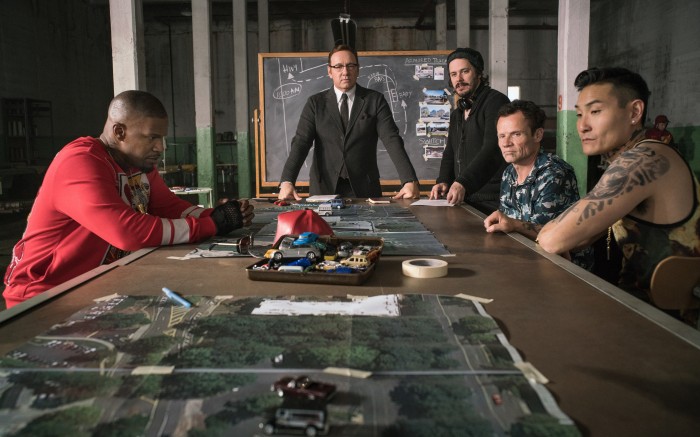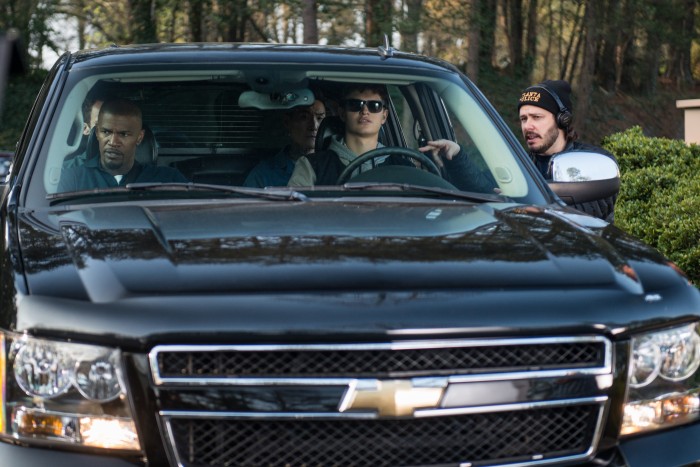Edgar Wright On The Movies That Influenced 'Baby Driver' [Interview]
Edgar Wright has the kind of track record any director would envy. His Cornetto trilogy is well loved by fans and critics alike, and at least two-thirds of it has attained "instant classic" status. When he ventured outside his usual wheelhouse with Scott Pilgrim vs. the World, the result was a dizzying video game-inspired fantasia that felt like nothing we'd seen before or since.
And by all accounts, he's knocked it out of the park again with Baby Driver, which pushes him into still more new territory. This one, you see, is a high-speed heist film that also happens to be a musical. Kinda. Sorta. It's complicated. We'll let him explain.
Last year, we got to chat with Wright on the Atlanta set of Baby Driver, and you can read our full conversation below. In it, Wright discusses his influences, the film's long journey to the screen, the Atlanta setting, and more.
I remember hearing you in interviews back during Scott Pilgrim vs. the World where you were name-dropping Baby Driver. How long has this project been developing for you? When did you first start writing the story?
I think I took the advance for the script in 2007. I delivered the script in 2011. I had the idea for a long, long time. I did a music video that was sort of like a trial run for it. And then in 2007 I decided I wanted to do it.
Was that the Mint Royale video?
Yeah, yeah, with Noel Fielding. It's developed since then, obviously. I started working on it after Hot Fuzz and then I finished writing it after Scott Pilgrim. So there's the process of research and trying to figure out the story and stuff. It was the first script I had written on my own for a long time, since I was like a teenager. The first solo screenplay I'd written since my first movie. Yeah, so quite a long time.
So how has it evolved and changed since you started working on it like ten years ago?
A lot. I guess it was more of a concept, initially, and I sort of knew what I wanted to do tonally, and what kind of movie I wanted it to be like, and what the general premise was. It was actually a nice voyage of discovery in terms of starting to build out the plot and the characters and the twists and things like that. And also, even once I started writing it, I started talking to ex-cons and real getaway drivers and FBI people and stuff. So that's always fascinating to me.
It was also something because I was writing something that's an American film and a crime film. I met this guy who's an amazing, an ex-convict who is now a writer called Joe Loya, who wrote a book called The Man Who Outgrew His Prison Cell, and I found him through a researcher and we became friendly. And so when I'd write pages I would sometimes send them to him and say, 'Does this sound kind of real?' I'm very aware of being English and middle class and thinking, 'How am I going to write an American crime film? I may as well get the okay from someone who has been inside for ten years. So it was a really interesting process in that respect.
We've heard this movie compared to a musical, I was wondering if you could talk a little about how it relates to that genre along with the timing and everything.
I mean, it is and it isn't. It isn't in the sense that it's not like Mamma Mia! I don't know why that was the first thing that came to my head. But there is a lot of music in it in terms of, Ansel's character is playing music the entire time. So it's not like a film where anybody sings out loud, but it's taking things that are in Scorsese or Tarantino or Steven Soderbergh films. In those films, you have the jukebox kind of soundtrack, and the idea with this is that the lead character is actually playing those songs. So the songs are always sourced. They're either in his ears or playing in a diner or playing on a stereo, so they're always within the scenes. So that's the premise of it really.
Is it wall to wall sound?
There's a lot of music in it, yeah. ... It's a lot of work. We have a great clearance person whose been working on it a long time. And actually, we've had time to do it, because we were going to shoot earlier and then we kind of delayed for a couple of reasons and that actually gave us time to clear all the music. So the unusual thing was that we cleared all the music before we started shooting, so we can actually play it on set, knowing that that's the track we're going to use.
Did seeing Mad Max: Fury Road last year give you pause about making this or did it put it a fire in your belly to do it more?
No, I mean, you know, that's an amazing piece of work. I think any director who saw that movie was like, 'Oh my god, what a masterpiece.' I got to know George [Miller] through that, because I actually had never met him, and then my sound designer was working on Fury Road. So I got to meet George just before it came out and I did a Q&A with him, and I've seen him a bunch of times since. I think I saw it like four times before it came out. And then I also paid to see it opening weekend because I wanted to support it. But, I don't know, that movie is incredible. Especially for a director to come along at 71 and just wipe the floor with everybody, after having not done a live-action movie for 19 years, is truly incredible.
 Were there any more specific influences on this film?
Were there any more specific influences on this film?
I think things from when I was growing up. I mean, there's obviously things like Scorsese's films and Tarantino's films. But a big influence on me, I really like Walter Hill's movies, Walter Hill's early movies, like The Driver and The Warriors. I love those movies and I liked his style. Walter is somebody else that I've got to know through doing Q&As, so I've made him fully aware. I've said, 'You know I'm totally ripping you off, right? We'll call it, it's a big tribute to you.' So I think a lot of those films, that would be a big influence. The Driver, Walter Hill's film, which, if you've never seen it, is really great.
At the beginning of production you Instagrammed a photo of David Bowie. Courtney [Hoffman], the designer, teased that you're really into his music and he had a big influence on you. I was wondering if he had any impact on the story.
Well, I don't know if you know this, but he died earlier this year. No, he's one of my favorite artists. It has nothing to do with anything on set. It's just, I'm a huge Bowie fan. He was my favorite artist so I was very sad to see him go. But also, it was a good excuse to reconnect with all of his songs. There is no David Bowie song in this film.
Since music is such a big part and you're filming in Atlanta and the film's set in Atlanta, do you have any Atlanta music? Is there like Mastodon or trap music or something in this?
You know what, there was a track, weirdly enough, the one track that I couldn't clear is one that was an Atlanta track. So I'm trying to find something else. I want to find something that's like an Atlanta, you know, musically, some of the stuff that's coming through. There was a track I wanted to use, but they hadn't cleared one of their samples so I can't use it. But we'll see. There will be something.
 What was it about Ansel [Elgort] that made you want him as the lead role? What about him really got to you?
What was it about Ansel [Elgort] that made you want him as the lead role? What about him really got to you?
I like that he's very musical. He plays instruments. He can dance. He's a DJ as well, he writes music. So that aspect of it. He's also very young, so he qualifies as a baby. It's also the idea of having someone like him, Ansel just turned 22, but to have him in the same frame as Jon [Hamm] and Jamie [Foxx] and Kevin [Spacey] and Jon Bernthal, it's great. You want to feel that the character is very young. It's kind of the point of the movie.
The title also shares its name with a Simon and Garfunkel song.
It does.
Does that give us insight into where they came from? Is there a connection there?
No, I always just liked that song. It's not inspired in terms of, like, the lyrics of that song don't really have anything to do with the movie. But it's definitely, that album and that song, I used to love a lot as a kid.
When was the decision made to set the movie in Atlanta, and how has that helped develop the film?
It's been good, actually, because as you probably know, a lot of films are shooting here, but not many of them are set here. I think one of the frustrations becomes that if you're shooting somewhere and it's not there, it becomes a lot of extra work. So as soon as we knew that it was a possibility and I came to look at it, I decided to rewrite it for Atlanta. And then I immediately became invested in doing it here. There are also elements of the story that make a lot of sense here, in terms of the music scene and the love of cars. I've never seen a city with more muscle cars in my life. And the crime. So it actually worked pretty well. I think the thing is, whenever I'd been here before – and I'd only ever been here on press tours, like Shaun of the Dead was the first time I came to Atlanta – so I think the last couple of times I went, I made a real point of just not going to the touristy spots, and trying to see the rest of the city and the places that you don't usually go.
You've got an eclectic group here, with Jon Bernthal and John Hamm and Jamie Foxx. You've got people all over the place. How did you pick these people out of the millions of people you could have chosen?
I think it was just the right people for the job in each role. They were the people that we went to. I did a read-through of the script in like 2012. I think Jon Hamm was the one actor who was at that read-through, playing the same part in it that he is in the movie. So that's nice. I always had him in mind, for sure.
